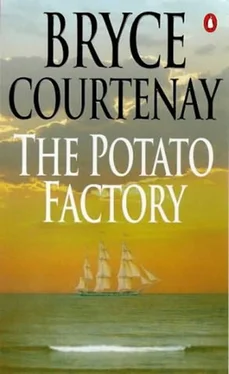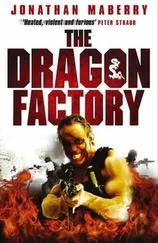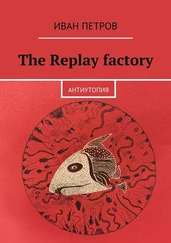Bryce Courtenay - The Potato Factory
Здесь есть возможность читать онлайн «Bryce Courtenay - The Potato Factory» весь текст электронной книги совершенно бесплатно (целиком полную версию без сокращений). В некоторых случаях можно слушать аудио, скачать через торрент в формате fb2 и присутствует краткое содержание. Жанр: Современная проза, на английском языке. Описание произведения, (предисловие) а так же отзывы посетителей доступны на портале библиотеки ЛибКат.
- Название:The Potato Factory
- Автор:
- Жанр:
- Год:неизвестен
- ISBN:нет данных
- Рейтинг книги:3 / 5. Голосов: 1
-
Избранное:Добавить в избранное
- Отзывы:
-
Ваша оценка:
- 60
- 1
- 2
- 3
- 4
- 5
The Potato Factory: краткое содержание, описание и аннотация
Предлагаем к чтению аннотацию, описание, краткое содержание или предисловие (зависит от того, что написал сам автор книги «The Potato Factory»). Если вы не нашли необходимую информацию о книге — напишите в комментариях, мы постараемся отыскать её.
The Potato Factory — читать онлайн бесплатно полную книгу (весь текст) целиком
Ниже представлен текст книги, разбитый по страницам. Система сохранения места последней прочитанной страницы, позволяет с удобством читать онлайн бесплатно книгу «The Potato Factory», без необходимости каждый раз заново искать на чём Вы остановились. Поставьте закладку, и сможете в любой момент перейти на страницу, на которой закончили чтение.
Интервал:
Закладка:
Mary imagined sleeping on this ledge so that she might see the stars at night. Slowly the desire grew in her and she would think upon this prospect as she lay in the stale dormitory filled with the tainted breath of forty other prisoners, a heaving, snoring body on either side of her. Finally she had determined that she was going to spend her first night of freedom on her secret rock under the stars.
Mary arrived at the rock no later than seven in the morning. She removed a clump of moss from deep within the recesses of the overhanging rock and carefully buried the clay pot. Inside it was the five hundred pounds she had saved. She replaced the moss and marked the spot with a handful of small pebbles which appeared to be resting naturally. Mary paused only to take a drink of water and wash her hands before leaving. With her she took her abacus and the small satchel in which she carried a pound in copper and silver and Mr Emmett's letter of recommendation. She walked further up the mountain slope, making a wide arc well away from her rock, until she found a woodcutter's path which led down to the precincts of Hobart Town.
She walked down Macquarie Street and into the centre of the town. Every inch of ground was taken up with some small business concern. Even the fronts of the houses and business establishments for some yards were taken up by traders with stalls and hastily erected sheds of canvas and hoarding. There were lollipop shops, oyster shops, barber shops and butcher stalls where flies hummed about the carcasses of lamb and kangaroo. Men and women shouted their wares at every approach with extravagant promises. 'Oyster the size of a plate!' one would shout. 'Fat lamb that weighs heavy to the pound!' cried a bloody-aproned butcher. 'Birds, song birds, what whistle hopera!' called a boy carrying a cage of yellow canaries.
At eight o'clock in the morning she was waiting at the doorway of the London amp; Overseas Insurance amp; Shipping Company, the first of the business concerns which had advertised for a bookkeeper clerk. Mary had arrived early, anxious to be the first if there should be a crowd of applicants. But she had no need to worry -Hobart Town had more billets for clerks than applicants to fill them.
By six o'clock that evening Mary had presented herself at each potential place of employ, dutifully proffering her letter of reference from Mr Emmett. Nothing had changed from her days in London. Mary was a woman, and a ticket of leave convict, and there had scarcely been a rejection of her services couched in even modestly polite language.
The first interview, which had taken place a few minutes after nine in the morning with the insurance and shipping company, had been no better or worse than the last. The manager, a tall, thin and exceedingly pompous chief clerk with the unprepossessing name of Archibald Pooley had looked askance at Mary, his eyes fixed on her mutilated hands. 'Be off with you, miss! I doubt that you could count to ten, but it would try my patience to test you even in this.'
'Please, sir, I have a reference.' Mary smiled brightly and proffered Mr Emmett's letter to the thin-lipped clerk.
He took the letter and held it up to the light. 'Ha! A forgery! No doubt about it!' He handed it back to Mary. 'Count yourself most fortunate that I do not have you arrested! Chief clerk of the colonial secretary's department, eh? You are not only forward but also most stupid. If this letter of reference had been from a lesser mortal than the inestimable Mr Emmett I might have believed in it.' Pooley wore an expression of utter disdain and now he tilted his head backwards as though assaulted by some odious smell. 'You reek of the Female Factory and you expect one to think you honest? Do you take me for a fool, miss?' He sniffed. Then his eyebrows shot heavenwards. 'Good God!' he exclaimed, pointing to Mary's abacus. 'What on earth is that?'
'Me abacus, sir. Please would you let me do a reckonin' for you, any calculation what is a part of your business?'
'Reckoning? On that contraption?' Pooley snorted. 'I sincerely trust you are not serious.'
Mary placed the abacus on a small table close to her and smiled.
'Any reckoning what pleases you, sir,' she said brightly, trying to hide her nervousness. 'As complicated as you wish.'
Pooley ignored Mary's request. 'That be a Chinee contraption, an abacus, is it not?'
'Yes, sir, and well able to do sums o' the most complicated nature,' Mary repeated.
'Not here it isn't!' Pooley said, alarmed. 'Beads for counting in my office? We do not count with beads here, just as we do not count with our fingers!' Then he brought his hands to his head. 'A woman and a convict who plays with beads thinks to clerk for me!' He spoke this at the ceiling and seemed for a moment genuinely upset that Mary should think so low of him. 'Your kind are made to be washer women not bookkeepers! Be gone, you have tried my patience long enough!'
As Mary left the scene of each not dissimilar rejection she could hear the words as they had reached her through the swirling, yellow mist of the London East India Docks: Mary, Mary, Bloody Mary…
You're the monkey on our back!
She walked in some despair to the edge of Hobart Town and then, looking carefully lest she might be followed, veered into the shadows of a stand of tall trees that led to her rock. A chill autumn wind blew down from the mountain and the light was fading under the trees as she made her way to her secret sanctuary.
She had bought a small loaf of bread and a tiny jar of maple syrup. She'd not had anything to eat since her bowl of gruel at daybreak, her last meal at the Factory. Mary would have loved to stop at the orphanage, if only for a few moments, to regain her courage. She suddenly longed to have her children skipping around her anxious to be held and loved, she yearned to hold a child in her arms and feel its tender skin against her cheek. She knew she would also greatly miss Elspeth Smedley's midday meal which, despite the tedious presence of Thomas Smedley, had always caused her to feel less a prisoner and more like a civilised person. For the better part of an hour each day she could pretend to be normal. Now she was back to being dirt on the street. Although she had earned her ticket of leave she was still regarded as convict scum and she longed for the comfort of Elspeth's quiet voice. 'I fear a little too much salt in the gravy, Mary. Will you forgive my clumsiness?'
Elspeth had invited her to eat at the orphanage any time she wished, but Mary knew that the resources of the Reverend Smedley were meagre enough and that Mrs Emma Patterson would now take her place at the table. Besides, Mary told herself, she could no longer return Elspeth's generosity. The bountiful supply of vegetables she had brought from the prison garden was no longer available to her, and her pride would not allow her to arrive empty-handed. Now, seated under the rock where it was already dark, she devoured the loaf which she had soaked in maple syrup. By the time she was finished her hands and face were sticky but she could not remember a treat more sumptuous. It was Mary's first meal free of the shackles, and if it had been a banquet set for a queen it could have not tasted better. Mary washed, the icy mountain water leaving her poor, twisted hands aching with the chill and her face devoid of feeling, then climbed to the top of the rock to spread her mattress roll and blanket.
Mary, who had spent many a dark night alone in some foul corner of a London alley, had never before slept open to the elements. Above her myriad stars frosted the dark sky. Though she felt some trepidation at so much open space, and though it was cold under the thin blanket, she was stirred by a strange feeling of happiness. She was free at last, born again under the crystal stars of the great south land, a child of the green parrots and the great mountain. Somewhere high up in the trees she heard the call of a nightjar and before she fell into an exhausted sleep she determined that in the morning she would once again visit Mr Emmett. She smiled to herself at the thought of the exasperation she would see on his small face, though she knew her benefactor was most fond of her.
Читать дальшеИнтервал:
Закладка:
Похожие книги на «The Potato Factory»
Представляем Вашему вниманию похожие книги на «The Potato Factory» списком для выбора. Мы отобрали схожую по названию и смыслу литературу в надежде предоставить читателям больше вариантов отыскать новые, интересные, ещё непрочитанные произведения.
Обсуждение, отзывы о книге «The Potato Factory» и просто собственные мнения читателей. Оставьте ваши комментарии, напишите, что Вы думаете о произведении, его смысле или главных героях. Укажите что конкретно понравилось, а что нет, и почему Вы так считаете.












